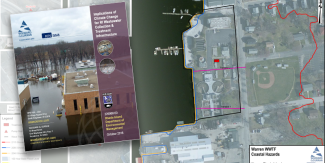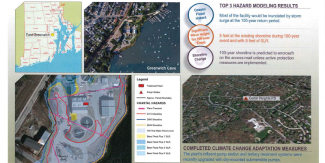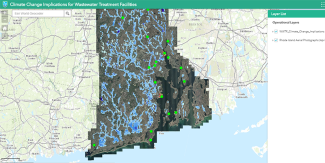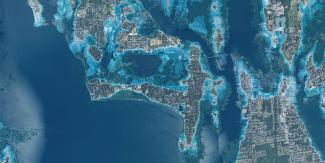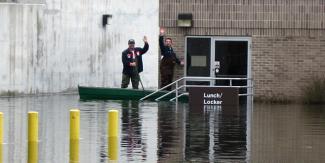Implications of Climate Change for RI Wastewater Collection & Treatment Infrastructure
In Rhode Island, as elsewhere, increasing storm intensities have damaged wastewater treatment plants and pump stations. It is expected that climate change will increase these threats. Our state is home to nineteen major wastewater treatment facilities which treat close to 120 million gallons of wastewater every day. Because water naturally flows downhill, many wastewater facilities and associated pump stations are at risk of inundation since their designs utilize low elevations, which are often riverine or coastal floodplains.
About the Study
The RI Department of Environmental Management, in collaboration with the state’s Office of Housing and Community Development, recognized the need to begin integrating climate change considerations into wastewater system planning and design. This study is a planning tool intended to help us all understand the projected implications of climate change on the state’s nineteen public wastewater treatment systems. It focused on the municipal treatment plants and the major pump stations that help bring flow to those treatment plants. It did not include wastewater infrastructure owned by private entities or onsite systems with subsurface disposal.
The study was undertaken in five steps:
- Assess the potential for impacts to Rhode Island caused by natural hazards associated with climate change;
- Preliminarily assess climate change impacts to Rhode Island wastewater infrastructure;
- Refine the assessment and the risk of impacts on Rhode Island wastewater infrastructure;
- Develop recommendations for adaptive strategies; and
- Compile the work in a technical report; offer the data used in the study online at no cost; and provide summary outreach materials for local officials and the public.
Additional Resources
- RI DEM Office of Water Resources: Design guidance for considering climate change
- NEIWPCC: TR-16 Guides for the Design of Wastewater Treatment Works
- NEIWPCC: Preparing for Extreme Weather at Wastewater Utilities: Strategies and Tips
- Inland/riverine flooding mapping and coastal changes
- Inland/riverine flooding data
- STORMTOOLS: Coastal mapping tool
- RI EMA: Floodplain Mapping Resources
- NOAA: Sea-Level Change Curve Calculator
- U.S. Army Corps of Engineering: “NACCS” study data (webpage may load slowly)
- US EPA: “Route to Resilience (RtoR) tool” for water and wastewater systems
- RI DEM Office of Water Resources: Low Impact Development Site Planning & Design Guidance for Communities
- RI DOH: SafeWater climate study of drinking systems
- Wastewater Treatment Facility Vulnerability Presentation (powerpoint)

